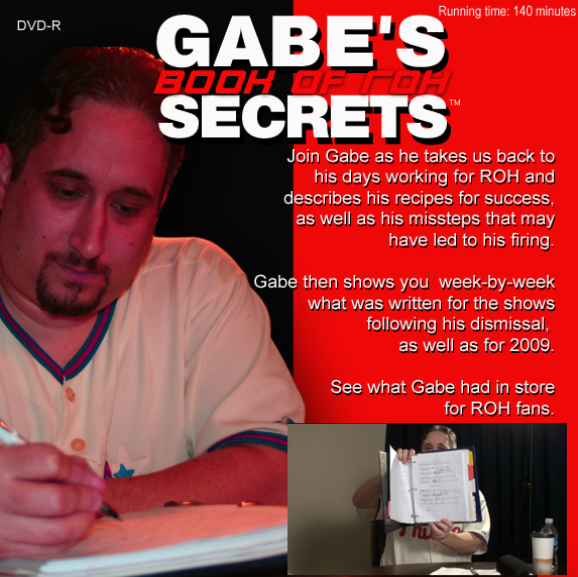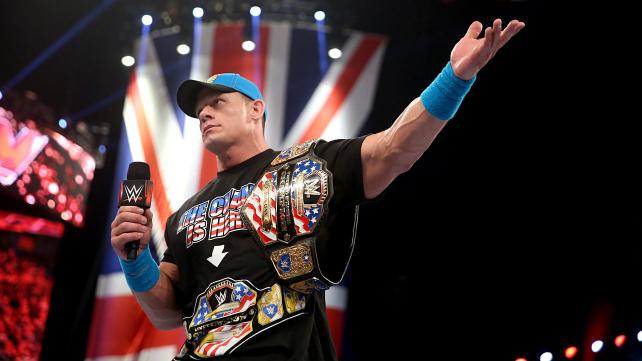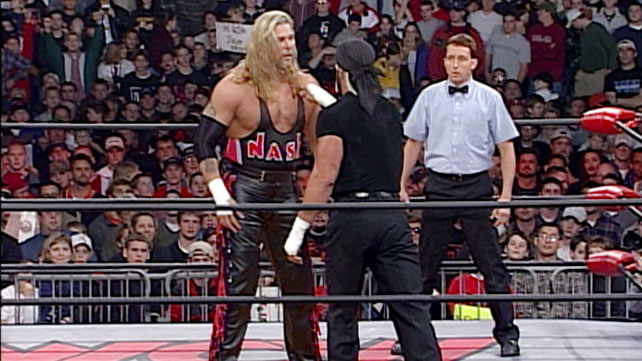Pro wrestling is a weird bastard art, and if you’re unfamiliar with its intricacies, the hordes of people in your social media circles obsessively pontificating about it every Monday night must be a truly confounding experience. Let our very own Dominic Griffin, lifelong wrestling enthusiast, teach you a little something right here, In This Very Ring…

This somewhat goofy looking man controlled one of the hottest properties in wrestling with a three ring binder AND YOU CAN TOO
Allow me to reintroduce myself. For eighteen installments, In This Very Ring has been my precious little corner of Deadshirt where I’m basically allowed to rant about a subject near and dear to me: professional wrestling. The original goal of the column was to help educate new fans and demystify a little of the industry, but somewhere along the way, a combination of my capriciousness and a personal malaise with WWE led to me moving away from the “Wrestling 101” approach, becoming less informative than I had initially planned and following whatever random muse caught my attention. Basically, if left to my own devices, this week’s column would be like 2000 words about Rick Rude’s mustache. I should not be left to my own devices.
So, now we’re repiloting. Going forward, ITVR is going to be more open-ended, and to make it more explicitly tied to sharing lessons, every column will be focused around questions from readers. That’s right, I’m issuing a recurring OPEN CHALLENGE.
For the inaugural episode utilizing this new format, we have a question from a Deadshirter who wished to remain anonymous.
Dear ITVR,
How does someone get involved in wrestling creative/developmental? Is it the same career track as wrestling? Do you start writing for indie promotions and work your way up? Or should I immediately pitch the WWE idea on how to save The New Day?
Sincerely,
Sadboy Zero
Thanks, Sadboy! This is as good a topic as any to get started with.
Wrestling is fake predetermined, so of course there has to be a creative force to drive the smash mouth narratives that tether the bouts to one another. In a traditional television series, there’s usually a showrunner who steers the ship, overseeing the writing team and keeping the myriad limbs of the production hydra from tangling over one another. In wrestling, the closest equivalent would be the role of the booker.
Typically, the booker is responsible for wrangling talent, creating storylines, and deciding the direction of their promotion. Put simply, the booker decides who wins and who loses, and has to balance those choices between what will serve the ongoing narrative and what will put asses in seats. Wrestling, moreso than any other medium, rests on the precipice between making money and telling stories, and the booker, if he’s doing his job right, does both.
Whereas we’re currently experiencing something of a renaissance in television with the age of celebrity showrunners (Matthew Weiner, Dan Harmon, Shondra Rhimes, etc), the role of the booker in wrestling remains one obfuscated from the public eye. Hollywood is supposed to be magical, but the process that goes into making that magic has been laid bare since the thirties. Even though the “secret” has been out about wrestling for decades, the business is still protected to a certain degree. There’s still a lot of carny in the blood, and no matter how mainstream wrestling gets, there is always going to be an illusionist’s distance between those in the business and those who consume it. The audience is kept at arm’s length, so that even the “smartest” fans don’t ever know for certain what’s going on behind the curtain. This is why Mike Quackenbush doesn’t get interviewed by Vulture at the end of a Chikara season. As smark-friendly a promotion as he runs, there’s a remaining sense of majesty in the mystery of pro wrestling that remains intact.
That said, there are still famous bookers in the business, each known for their storytelling hangups, the tropes they innovated or notable blunders they’re blamed for. Often, a booker is an ex or current wrestler themselves, as is the case with aforementioned Chikara godfather Quackenbush, or Jado & Gedo, the junior heavyweight tag team that runs New Japan. In both of their cases, you have guys who smartly play supporting roles in their product so they don’t personally benefit from their own authority. Otherwise, you could be the type of person who books yourself as the champion of your own promotion. Tons of guys have done it—Dusty Rhodes, Verne Gagne—and not always for selfish reasons. That Kevin Nash allegedly booked himself to end Goldberg’s streak in WCW comes to mind, but the shit show that followed that particular transgression makes it hard to argue he was doing himself any favors.
Dusty’s tenure as a booker with Jim Crockett Promotions and later, WCW, is rife with storytelling paradigms that still get used today. Just look at the controversial ending of the recent Elimination Chamber event, utilizing the “Dusty finish” originally popularized in Ric Flair’s hay day. Much of the post-modern, Kayfabe 2.0 style prevalent today comes from Paul Heyman’s time running ECW and, through influence and inspiration, Gabe Sapolsky’s run writing Ring of Honor.
As much as the idea of a “wrestling auteur” fascinates, you’re probably wondering “what about the WWE? Who’s the head booker there?”
Well, Vince, right? He’s still in charge of what happens, but, and this is where it gets weird, his current model has evolved to the point that WWE resembles a regular TV show’s process. Most wrestling promotions have always been run by a promoter who gets the business or a particularly savvy wrestler who’s moved backstage, but Vince’s relationship with the industry has always been contentious. He’s about as embarrassed to be considered a “wrestling promoter” as Zack Snyder was in calling Clark Kent “Superman.” That’s why he calls it “sports entertainment” and that’s why he surrounds himself with former soap opera writers.
Vince Russo, essentially the Joe Eszterhaus of professional wrestling, ran WWF Magazine before moving into creative. McMahon has always thought outside of the traditional box, so he looks anywhere but wrestling for his ideas, even when those ideas and sources of inspiration are dubious at best. He’s a man woefully disconnected from popular culture who insists on trying to stay relevant with it. This is why Freddie Prinze Jr. and late comedian Patrice O’Neal used to work in WWE Creative. It’s why an episode of Raw typically feels more like the bastard child of Jerry Springer and Rollerball than what used to be the standard wrestling product. It’s a weird, mixed bag of unfunny comedy and inconsistent continuity, with the wrestling itself an incongruous side show.
This shift happened with the competition as well, especially back in the nineties in WCW, when booking committees had to duke it out with corporate interests, leading to a pretty muddled finished product. With Vince being the only game in town, for the most part, you have a better chance breaking into WWE Creative from Days of Our Lives than you do studying the wrestling business, and that’s really sad. There are exceptions. Movie producer Jeff Katz had his (still unseen) Wrestling Retribution Project which tried to remodel sports entertainment after prestige television. Former ROH World Champion Nigel McGuinness tried getting a similar project off the ground through crowdfunding, proving that if you can get enough money together, you can write all the wrestling stories you want, otherwise you’re as likely to play booking simulators like Extreme Warfare.
My real suggestion would be to find a local wrestling school and get trained. Learn the real ropes of the business so you can operate with real knowledge beyond internet fan conjecture. Find a small promotion to work with, either as an in-ring performer or a manager, maybe as an announcer or something. Bide your time. Offer some ideas when it fits. If you’re involved with an open-minded, forward-thinking promotion, you could find yourself involved creatively in a manner more fulfilling than trying to impress Vince McMahon with dick and fart jokes.
A cautionary tale, first. Wrestling isn’t like your fan fiction. There are real life performers whose bodies get put on the line, and even though wins and losses aren’t “real,” you’re personally responsible for helping present these talents in a way that enables them to flourish, both artistically and financially. You may watch Raw and think “I could book better than this,” but unlike being dissatisfied with an episode of Game of Thrones, there are more tangible IRL variables to consider that purely scripted fiction doesn’t have to regularly concern itself with.
This brings me back to why the role of the booker isn’t as public as that of a television showrunner. To illustrate, here’s a pretty cool magic trick.
Fun shit, right? There’s a viral version of this trick going around right now in an Irish pub and people are losing their shit over it. As a casual magic enthusiast it’s been one of my favorites for years. As an obsessive asshole, I had to know how it worked. So I watched this:
Watch this tutorial and then rewatch the original trick. Unlike a film’s special features on a blu-ray, seeing how the sausages get made in magic, and wrestling, just sours it somehow. The “Dusty finish” used to be a great storytelling trick, and it worked so well because it was a time before the internet and national television. Dusty could book it in town and after town and no one was the wiser. Today, the mechanics have been demystified, and it’s rarely executed well enough to work the same way again. Just ask Dean Ambrose.
Further Viewing: Any of Kayfabe Commentaries’ Guest Booker series, where famous bookers are interviewed about their methods and tasked with rewriting infamous angles. I personally like this Terry Taylor one.
Follow @DeadshirtDotNet and @captain_fuck on Twitter where we’ll be available to answer any possible question you could have about wrestling.
Support In This Very Ring by contributing to Deadshirt’s Patreon!




Longtime listener first time caller. In the spirit of the open challenge, could you talk about the open challenge itself (history, implications)
Other suggested topics
Factions (seriously booking aside why did the nexus fail but the shield is amazing)
why kevin steen/owens is the greatest